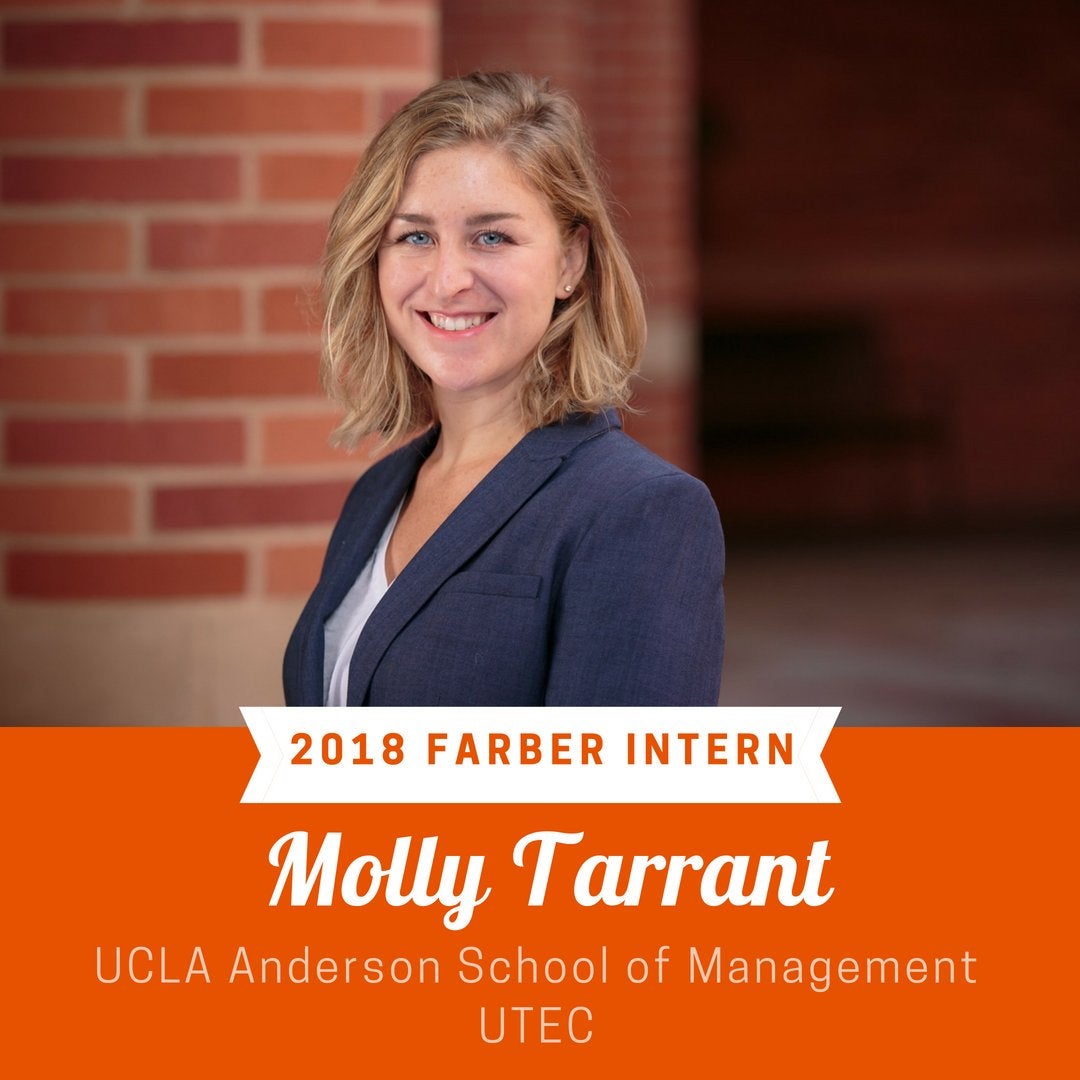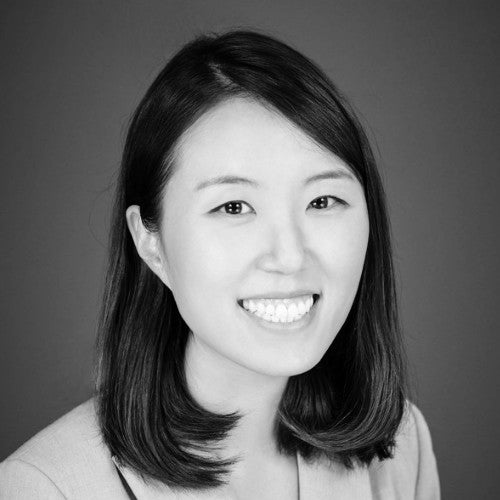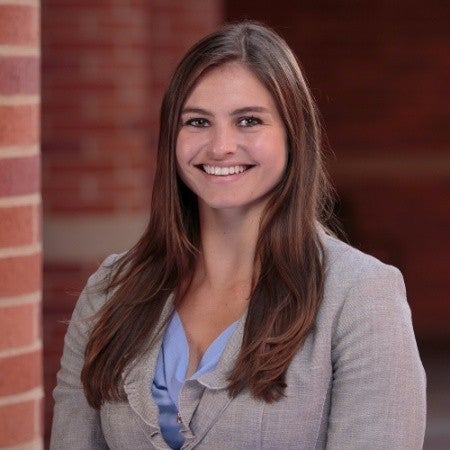Haskamp Fellows
This Fund Makes It Possible to Pursue an MBA and a Social Impact Career

UCLA Anderson's Haskamp Fund, managed jointly by the Price Center for Entrepreneurship & Innovation and Impact@Anderson, grants fellowships to first-year MBA students to pursue summer internships in nonprofit or the public sector. The Haskamp Fellowship makes it possible for UCLA Anderson MBA students to lend expertise to benefit organizations that may not otherwise be able to afford it.
In 2018, seven Haskamp Fellows in the Class of 2019 fulfilled vital functions at organizations devoted to education, affordable housing, the arts and more.
 Molly Tarrant, an active member of Anderson’s Net Impact chapter, applied her experience in philanthropy and nonprofit consulting to venture philanthropy firm REDF, which invests in a portfolio of social enterprises that train hard-to-employ populations. She focused her work at UTEC, an organization that supports gang-involved youth in the Boston area by providing them with education, life skills and job skills. “My project was to help the organization’s woodshop social enterprise raise its revenues from product sales,” says Tarrant, who plans to pursue a strategy role at a social enterprise focused on employment, housing or health when she graduates. “By the end of the summer, I created a direct-to-consumer online sales channel.”
Molly Tarrant, an active member of Anderson’s Net Impact chapter, applied her experience in philanthropy and nonprofit consulting to venture philanthropy firm REDF, which invests in a portfolio of social enterprises that train hard-to-employ populations. She focused her work at UTEC, an organization that supports gang-involved youth in the Boston area by providing them with education, life skills and job skills. “My project was to help the organization’s woodshop social enterprise raise its revenues from product sales,” says Tarrant, who plans to pursue a strategy role at a social enterprise focused on employment, housing or health when she graduates. “By the end of the summer, I created a direct-to-consumer online sales channel.”
 Kathryn Li traveled to several rural communities in India for nonprofit Arodhum International, which helps children in India with education and health care needs. Li worked for seven years in wealth management prior to her transition into consulting for Arodhum through UCLA Anderson’s Social Impact Fellows program. Her summer project goals included identifying best practices in public health education for rural villages, determining the gap between existing knowledge and ideal level of understanding in preventive health care, and developing a framework for public health education materials. “My in-country ethnographic research will ultimately inform the design of a pediatric health care model for Arodhum to help educate rural communities on the importance of hygiene and public health services,” says Li.
Kathryn Li traveled to several rural communities in India for nonprofit Arodhum International, which helps children in India with education and health care needs. Li worked for seven years in wealth management prior to her transition into consulting for Arodhum through UCLA Anderson’s Social Impact Fellows program. Her summer project goals included identifying best practices in public health education for rural villages, determining the gap between existing knowledge and ideal level of understanding in preventive health care, and developing a framework for public health education materials. “My in-country ethnographic research will ultimately inform the design of a pediatric health care model for Arodhum to help educate rural communities on the importance of hygiene and public health services,” says Li.
 Logan Van Meter's background in health care consulting and wellness technology led her to Napa’s Dry Farm Wines, the world’s only health-focused wine club. She served as an intern partner and health evangelist for the organization, which values sustainable farming practices — such as the dry farming in its name — and sources its wines from small family enterprises. “When built with intention, business can be a powerful force for positive change,” says Van Meter, also a Forté Fellow. She developed a new inventory management system and metrics dashboard, in addition to researching more environmentally friendly alternative packaging, to help Dry Farm Wines achieve its mission more efficiently and sustainably as it scales.
Logan Van Meter's background in health care consulting and wellness technology led her to Napa’s Dry Farm Wines, the world’s only health-focused wine club. She served as an intern partner and health evangelist for the organization, which values sustainable farming practices — such as the dry farming in its name — and sources its wines from small family enterprises. “When built with intention, business can be a powerful force for positive change,” says Van Meter, also a Forté Fellow. She developed a new inventory management system and metrics dashboard, in addition to researching more environmentally friendly alternative packaging, to help Dry Farm Wines achieve its mission more efficiently and sustainably as it scales.
“My first year at Anderson prepared me to efficiently organize and manage all the moving parts and conversations through our emphasis on teamwork,” Van Meter says. “I learned my strengths within a team and how to execute effectively, which was invaluable in completing my project for Dry Farm Wines under such a condensed time frame.”
MBA student interns offer management thinking in arenas that might not approach operations with a business mindset. “I asked a lot of questions that weren’t typically asked within that organization,” says Tarrant of UTEC. “I ran into real-world examples of almost every topic we discussed in Gayle Northrop’s Social Entrepreneurship class — on practically day three, I was calculating social costs and trying to figure out double-bottom-line accounting.”
What advice are Haskamp Fellows offering to first-years who want careers in prosocial organizations? Tarrant says, “There are interesting, successful organizations that aren’t able to advertise opportunities on campus. Take a look at job boards like Idealist, Net Impact and BCorp, and seek support at Parker for your off-road journey!”
Van Meter adds, “If you came to Anderson with a mission to transition into an unusual or less traditional career path, don’t let yourself be distracted by early offers that don’t quite meet your needs. Trust in the process, look in unexpected places and don’t be afraid to ask.”
The Heiko Haskamp Memorial Fund was created by the Class of 1988 and endowed by their 15-year reunion gift. It honors their late classmate Heiko Haskamp, a magna cum laude Dean’s List graduate from Boston University with a degree in electrical engineering, who died before completing his second year of business school.
Four other UCLA Anderson students in the Class of 2019 pursued summer internships as Haskamp Fellows in 2018:
- Greg Comanor, who came to UCLA Anderson to focus on Southern California’s affordable housing crisis and who is securing financing for a small development of permanent supportive housing in South L.A., spent the summer with Meta Housing Corporation strategizing project roadmaps to streamline the development process.
- Oxana Ermolova worked as the director of operations for Arts Bridging the Gap, an L.A. nonprofit that engages at-risk youth and increases high school graduation rates. Ermolova focused on formalizing a strategic plan for organizational growth while building the systems and procedures required to scale operations successfully over the next fiscal year, presenting a status report of key metrics to the board of directors.
- Julie Ortega, whose career focus is strategy in the poverty alleviation space, interned at Save the Children U.S., serving on its portfolio growth and performance team. She performed strategic growth analysis and helped create and enhance USAID-funded program proposals.
- Melinh Rozen, a former kindergarten teacher with Teach for America in Atlanta, served as a growth and strategy MBA intern at San Francisco-based Wonderschool, whose mission is to provide high-quality care to every child in America. She worked on building out scalable marketing, recruitment and on-boarding processes for parents and partners. “Socially minded businesses can help fill gaps in public solutions,” she says.